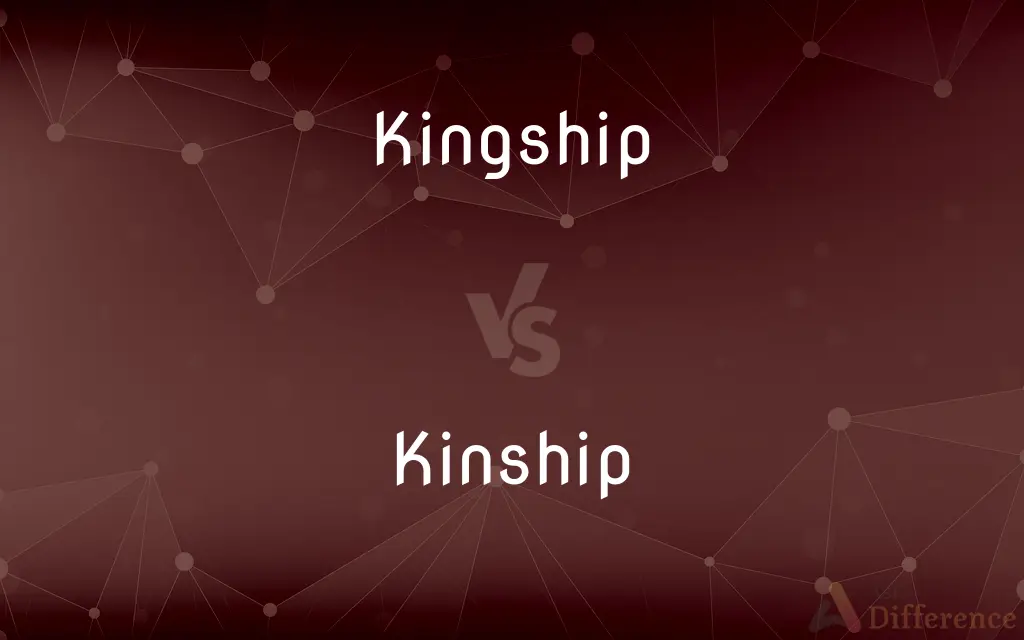Kingship vs. Kinship — What's the Difference?
Edited by Tayyaba Rehman — By Maham Liaqat — Updated on April 16, 2024
Kingship involves the position or authority of a king and the related governing responsibilities, whereas kinship refers to the connections between individuals based on familial ties.

Difference Between Kingship and Kinship
Table of Contents
ADVERTISEMENT
Key Differences
Kingship is a form of leadership and governance associated with monarchies, where an individual rules over a state or territory, often inheriting the position through familial lines. On the other hand, kinship encompasses the social bonds and relationships derived from common ancestry, marriage, or adoption, focusing more on interpersonal connections than governance.
In cultural contexts, kingship is imbued with ceremonial and symbolic significance, reflecting a nation's history and identity through rituals and traditions associated with the monarchy. Whereas, kinship plays a fundamental role in societal structures, influencing social practices, inheritance, and familial responsibilities across diverse cultures.
Kingship often comes with specific duties and powers defined by constitutional or traditional laws, which dictate the king's role in state affairs and governance. In contrast, kinship does not confer formal powers but establishes moral and social obligations among family members, such as support, loyalty, and care.
The concept of kingship can also influence national politics and identity, as the monarch often embodies the state's continuity and stability. Conversely, kinship affects personal identity and social networks, providing individuals with a sense of belonging and support within a familial or community context.
Historically, kingship has been a pivotal aspect of governance and has shaped many political systems around the world, with kings acting as central figures in statecraft and law. Kinship, meanwhile, has shaped social organization, dictating everything from residential patterns to inheritance laws.
ADVERTISEMENT
Comparison Chart
Definition
Authority and governance associated with a monarch
Social bonds derived from common ancestry or ties
Focus
Governance, leadership, state affairs
Family relationships, social obligations
Cultural significance
Symbolizes national identity and continuity
Fundamental to social structure and practices
Legal implications
Defined roles in governance and law
Influences inheritance and familial duties
Influence on identity
Reflects on national and political identity
Shapes personal and familial identity
Compare with Definitions
Kingship
The authority and rank of a king within a monarchy.
His study of medieval Europe focused on the evolution of kingship.
Kinship
Cultural or social practices governed by familial relationships.
Kinship determined their living arrangements and obligations.
Kingship
A system of government led by a king or queen.
Kingship in that country is hereditary, passing from parent to child.
Kinship
The state of being related to others by blood or marriage.
Kinship ties influenced social structures in the community.
Kingship
The role of a king in state and ceremonial functions.
His kingship was marked by significant political and social reforms.
Kinship
A system determining familial roles and responsibilities.
Her research focuses on kinship and inheritance practices.
Kingship
The symbolic representation of a nation’s unity and continuity.
The coronation reaffirmed the kingship's role in national identity.
Kinship
A network of social ties deriving from common ancestry.
The festival celebrated the deep kinship among clan members.
Kingship
The historical and cultural practices associated with being a monarch.
The ceremony was steeped in traditions of kingship.
Kinship
The sense of belonging or connection among family members.
They shared a strong sense of kinship that transcended generations.
Kingship
The domain ruled by a king; a kingdom.
Kinship
In anthropology, kinship is the web of social relationships that form an important part of the lives of all humans in all societies, although its exact meanings even within this discipline are often debated. Anthropologist Robin Fox states that "the study of kinship is the study of what man does with these basic facts of life – mating, gestation, parenthood, socialization, siblingship etc." Human society is unique, he argues, in that we are "working with the same raw material as exists in the animal world, but [we] can conceptualize and categorize it to serve social ends." These social ends include the socialization of children and the formation of basic economic, political and religious groups.
Kingship
The state, office, or dignity of a king; royalty.
Kinship
State of relatedness or connection by blood or marriage or adoption
Kingship
The position, power, or province of a king.
Kinship
Connection by heredity, marriage, or adoption; family relationship.
Kingship
The period or tenure of a king; a reign.
Kinship
Relationship by nature or character; affinity.
Kingship
Used with his as a title for a king.
Kinship
Relation or connection by blood, marriage or adoption
Kingship
A monarchy.
Kinship
Relation or connection by nature or character
Kingship
The dignity, rank or office of a king; the state of being a king.
Kinship
Family relationship.
Kingship
A monarchy.
Kinship
A close connection marked by community of interests or similarity in nature or character;
Found a natural affinity with the immigrants
Felt a deep kinship with the other students
Anthropology's kinship with the humanities
Kingship
The territory or dominion of a king; a kingdom.
Kingship
The dignity or rank or position of a king
Common Curiosities
What responsibilities are associated with kingship?
Kingship responsibilities typically include governing the nation, representing the state in diplomatic matters, and fulfilling ceremonial roles.
What legal roles does kinship play in society?
Kinship plays a critical role in legal contexts, especially in matters of inheritance, custody, and familial rights.
Can kingship impact cultural traditions?
Yes, kingship can profoundly impact cultural traditions, particularly through ceremonial roles and the perpetuation of historical practices.
How does kinship differ in various cultures?
Kinship can vary significantly, with some cultures emphasizing matrilineal descent while others prioritize patrilineal ties.
Can kinship influence economic decisions?
Yes, kinship can influence economic decisions, particularly in contexts where family businesses or land ownership are involved.
What is the significance of kinship in anthropology?
In anthropology, kinship is crucial for understanding social organization, marriage patterns, and community relations.
How does kinship affect social behavior?
Kinship influences social behaviors by establishing expectations for familial loyalty, support, and interaction within communities.
How do kingship and kinship interact in a monarchy?
In monarchies, kingship and kinship often interact closely, as royal duties and succession are typically tied to family lineage.
Is kingship always hereditary?
While kingship is often hereditary, some monarchies have provisions for elective monarchs, though these are less common.
What symbols are associated with kingship?
Symbols of kingship include crowns, scepters, and thrones, each representing different aspects of monarchical authority.
Can kinship ties extend beyond immediate family?
Kinship ties can extend beyond immediate family to include distant relatives, clan members, or even adoptive relationships.
How do modern societies view kingship?
Modern societies' views on kingship vary, with some viewing it as an outdated form of governance and others cherishing it as a vital tradition.
What challenges can arise in a kingship system?
Challenges in kingship systems can include issues of succession, the balance of power with other state organs, and maintaining relevance in modern governance.
How does kinship affect individual identity?
Kinship affects individual identity by framing one's role within the family and larger community, often influencing personal values and priorities.
What is the best way to study kinship?
The best way to study kinship is through field studies, ethnographic research, and examining family histories and social practices.
Share Your Discovery

Previous Comparison
Chap vs. Gentleman
Next Comparison
Company vs. StudioAuthor Spotlight
Written by
Maham LiaqatEdited by
Tayyaba RehmanTayyaba Rehman is a distinguished writer, currently serving as a primary contributor to askdifference.com. As a researcher in semantics and etymology, Tayyaba's passion for the complexity of languages and their distinctions has found a perfect home on the platform. Tayyaba delves into the intricacies of language, distinguishing between commonly confused words and phrases, thereby providing clarity for readers worldwide.
















































